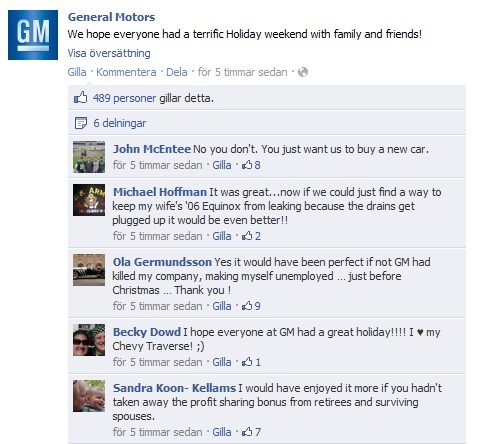Since I started blogging in early 2004, I’ve heard over and over again how brands have lost control of their reputation. Power has shifted away from brands and towards customers, employees and other individuals. With new publishing platforms, ordinary citizens have gotten the possibility to voice their opinions and influence businesses and organizations trough social media. Nowhere is this more evident today than on brand pages on Facebook.
Due to the sheer volume of individuals that are present on Facebook, any people that have a bone to pick with a brand will almost automatically gravitate towards the Facebook page of that company simply because of the amount of exposure that comment can get. Sure, you can still influence by writing blog posts and using other channels, but writing on the wall on a Facebook page is more direct, you feel like you are talking directly to the brand and its customers, right on its turf.
If you visit the Facebook page of a brand and it is nothing but a steady stream of negative comments, it will probably influence how you view this brand (see also my post about Chiquita on Facebook). Take a look at General Motors for example. I’ve written two blog posts about how Saab fans have turned the GM page into a big mess, while GM have done nothing. But GM have other problems on Facebook. People are complaining about everything from problems with cars to bad service. They are complaining about working conditions and the fact that GM killed off the Pontiac brand.
When GM wishes everyone a nice holiday, “fans” are responding with all sorts of negative comments, mostly about the decision by GM to cut Christmas bonuses for retirees. This post has 106 comments, at least half are probably negative.
It has now been more than two weeks since the first outburst of criticism from angry Saab fans and finally we are starting to see some activity from GM. There aren’t as many Saab photos posted as it was a week or two ago, but they keep coming. But maybe this incident pushed GM into taking a bit more care of their page than they previously did. Representatives from GM Customer Service have now responded to a few posts by fans and even the admin of the GM page has responded a few times.
A brand should not let critics run their Facebook page. If you are the subject of a smear campaign, like GM with the Saab story, you can’t comment on everything but you need to find a balance where you let critics comment but you don’t surrender the entire conversation to your opponents. As a brand, listen to the opinion and try actively to solve the issue.
Facebook has become an important driver of corporate reputation. If you don’t think that your Facebook page reflects reality, then you should do something about it. If you don’t, we are left to believe that this is how the world views your brand.

